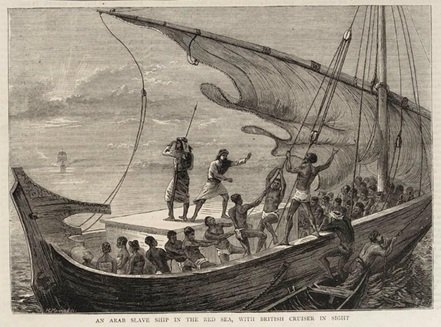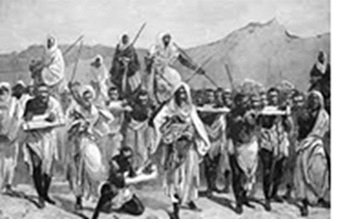By Abdikarim H Abdi Buh
The recently concluded 38th African Union (AU) Summit in Addis Ababa placed a strong emphasis on reparatory justice for Africans and people of African descent. Leaders passionately called for compensation from former European colonial powers for the transatlantic slave trade and its long-lasting effects on Africa’s development. However, amid these discussions, one crucial aspect of African history was conspicuously absent—the Arab slave trade.
This article is a rejoinder to a recent publication on WardheerNews titled The Arab Slave Trade: A Forgotten Chapter in African History by Mohamed A. Yasin. While I concur with the author’s premise that the Arab slave trade, represents a significant yet often overlooked historical injustice, I further argue that the Arab world has yet to formally acknowledge the profound human toll inflicted on African communities. Moreover, there has been no meaningful engagement with the discourse on reparations, which remains a critical yet unaddressed dimension of this historical legacy.
This silence raises an important question: Why does the AU, a body representing 55 African nations, continue to sidestep the issue of the Arab slave trade when addressing historical injustices?
Diplomatic and Geopolitical Sensitivities
One of the most significant reasons for the AU’s avoidance of this topic is its delicate diplomatic relationships with Arab nations, particularly those in the Gulf. Countries like Saudi Arabia, the United Arab Emirates, Qatar, and Egypt maintain deep economic, political, and religious ties with many African states. These nations invest billions in infrastructure, aid, and trade partnerships across the continent. A direct discussion on the role of Arab traders and rulers in the enslavement of Africans over centuries could damage these relationships and potentially result in economic retaliation or reduced diplomatic cooperation.
For African leaders, raising the issue could mean jeopardizing foreign aid, trade deals, and strategic partnerships. As a result, they tread carefully, choosing instead to focus on reparations from European nations—who, unlike their Arab counterparts, have at least acknowledged historical wrongdoing.
A Convenient Narrative: European Colonialism as the Sole Villain
The African Union, and many within the global reparation’s movement, frame discussions of historical justice around European colonialism and transatlantic slavery. While this narrative is factually sound, it is also selective. The European trade, which forcibly transported an estimated 12 to 15 million Africans to the Americas, left devastating consequences that continue to impact Africa today. However, the Arab slave trade, which spanned over 1,300 years and enslaved around 18 million Africans, remains largely unaddressed.
One key difference is that the transatlantic trade is well-documented, with European powers such as Britain, France, and Portugal having formally apologized or acknowledged their involvement. The Arab slave trade, on the other hand, is less widely recognized, and its impact is often downplayed in African history books. The AU’s preference for targeting European powers rather than Arab states suggests a selective approach to historical accountability.
Internal Complicity: A Painful Truth
Another complicating factor is that many African rulers and merchants actively participated in the Arab slave trade. Unlike the transatlantic trade, where European ships directly transported slaves from Africa, the Arab trade relied heavily on African intermediaries. Local warlords and rulers engaged in slave raiding and sold captives to Arab traders.

Addressing this history would require African nations to acknowledge that some of their own ancestors played a role in the enslavement of fellow Africans. This is a sensitive issue that many would rather avoid, as it contradicts the common narrative of Africa being solely a victim of external forces.
Religious and Cultural Taboos
Since the Arab slave trade was largely conducted under the influence of Islamic empires and traders, discussing it openly could provoke religious tensions. Many African countries have large Muslim populations, and leaders may fear that bringing up the issue would be perceived as an attack on Islam itself, despite the fact that Islam, in its essence, does not condone racial slavery.
Additionally, some of the practices associated with the Arab slave trade, such as the castration of African male slaves to create eunuchs for service in Arab courts, remain deeply disturbing subjects that many prefer to leave unexamined. Unlike the transatlantic trade, where African slaves retained their reproductive capabilities and contributed to the creation of vibrant African-descendant populations in the Americas, the widespread castration of African slaves in Arab lands meant that there is no significant African diaspora in those regions today, despite the large number of Africans taken.
The Way Forward: A More Honest Approach to History
If Africa is serious about reparatory justice, it must confront all aspects of its history, not just those that are politically convenient. The transatlantic slave trade and European colonialism undoubtedly had catastrophic effects on Africa, but so did the Arab slave trade, which lasted much longer and was equally brutal.
For the African Union to claim true moral authority on reparations, it must be willing to engage in uncomfortable discussions—even when they challenge alliances and internal narratives. This includes demanding acknowledgment and accountability from Arab states, not just European ones. The AU should also encourage academic research, historical documentation, and educational reforms to ensure that future generations understand the full scope of Africa’s history.
As the African proverb wisely states, “A cowardly leader is like a chameleon; he changes colors but never direction.” African leaders must demonstrate the courage to face uncomfortable truths rather than shifting blame to where it is most convenient. True justice demands honesty, not selective memory.
Ultimately, a selective approach to reparatory justice weakens Africa’s moral stance on historical accountability. If the AU truly believes in justice for Africans, it must be willing to confront all those who played a role in Africa’s historical suffering—regardless of political consequences.
Abdikarim H Abdi Buh
Email: abdikarimbuh@yahoo.com
__________
Related articles
The Arab Slave Trade: A Forgotten Chapter in African History by Mohamed A. Yasin


Leave a Reply